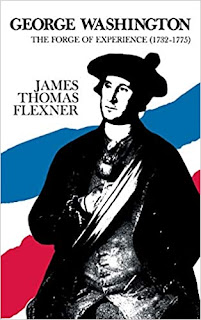
George Washington: The Forge of Experience (1732-1775)
-James Thomas Flexner
Little, Brown & Company
390 Pages
The first book of my big project is done. There are only about 250 more to go. When I made the plan to read at least two biographies of each President in order that they served in that capacity, I understood that it would be a daunting task. I figured that I would start with one of the drier tomes in order to make it just a little bit easier as I went on. I thought that if I could get through those books early, it would make the rest of the books seem that much simpler.
James Thomas Flexner wrote a four-volume biography about George Washington between 1965 and 1972. The first volume, The Forge of Experience (1732-1775), was the book that kicked off my project. It took me just over five days to read this book, which is a long time for me. I ended up taking my time reading this and ended up researching some of the events in the book as I read. Then I did some minor research on the cast of characters who had an impact on Washington’s life. All this led to a slower reading than normal.
Flexner’s first volume is not exactly an easy read. It’s not terrible, either. There is definitely a dated feel to the style, and Flexner tends to use archaic words that sometimes require a thesaurus or dictionary for translation. This book is a scholarly work, probably not intended for a casual reader, although with perseverance, those minor obstacles could be overcome if you were interested in taking on the challenge.
A lot of times, it seems like biographies and stories about Washington tend to lean towards hero worship and deification. In the introduction, and in several places along the way, Flexner refers to Washington as “our hero.” However, there’s not a lot of actual hero worship in his writing. Flexner tends to show all the warts of a young George Washington. He includes the infamous hot temper and his constant complaining to senior officers. And there is a lot of that.
This book covers George Washington from his birth until he is named Commander of the Continental Army in 1775. Many of his formative moments through his youth and time in the militia during the French & Indian War are well researched with great analysis made by Flexner. He describes these moments in relation to Washington’s maturation with each experience and additionally relates how those events define similar moments later in his life, especially during the Revolution and terms as President. Together, Flexner gives the reader an evolution of George Washington.
As far as the first book in my President’s project was a slow read, it was a very capable start. This will set the stage for the next books in this series. As we get into the Revolution next, I expect a little more “excitement” than I read in this book of Washington’s formative years. The same goes for his Presidential years.
If you’re thinking of attempting a similar reading challenge, this book would be a good start. It would be a litmus test of what you think you can do. If you can make it through the heady words and sometimes dry narrative, you can make it through this whole project. It is a good book that has been exquisitely researched and written. It gives an intimate look at the early years of George Washington’s life, an era that seems to have been grossly overlooked by most history books, other than the ridiculous fable by Parson Weems about a cherry tree.

Craig Bacon thanks you for following his latest adventure.
Originally published on Niagara’s Water Cooler. Republished with permission.
All WNY is made possible thanks to coffee and sleep deprivation.
We appreciate your readership. We like money, too.
